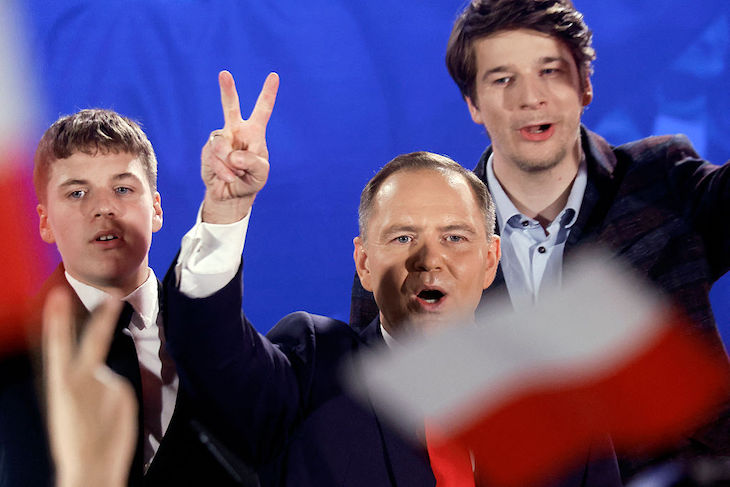A change in politics is coming. Until now, the progressives were the ones with networks, stemming from Joe Biden’s White House, to think tanks, and the legacy media. For the right, politics was not a fair fight. The internet has changed that. Karol Nawrocki’s win in Poland’s presidential election marked a key moment in the translation of the new right from the internet to geographical reality. Donald Trump’s backing was combined with that of Kristi Noem, the US Secretary of State for Homeland Security, at Poland’s first ever Conservative Political Action conference (CPAC).
A change in politics is coming
From the 1960s onwards, the progressives turned universities into a reproduction mechanism for their own political ideals in a ‘long march through the institutions’. Conservative ideas were forced online. Right-wingers adapted to online systems of idea replication, becoming more aggressive to optimise for social media engagement. It took Trump’s two elections to get the ‘Internet Right’ into the institutions. But now it is making the running – in the US, and increasingly in Europe.
The first CPAC Poland, held between two rounds of a tight Presidential race, is a testing ground of how the ‘Internet Right’ moves from the digital world to the physical. Poland is fertile ground for a right-of-centre international movement. The country is conservative by temperament, hugely pro-American, and, unlike neighbouring Hungary, doesn’t have close ties to China, presenting no conflict of interest for U.S. trade policy.
The difficulty for the ‘Internet Right’ is how to present a global conservative message without turning into the sort of slogan-based conformist movement it emerged to undermine. CPAC aims to create an alliance of ‘make x country great again’ nations. But this Trumpist slogan looks downright bizarre emblazoned on a hat in Poland, a country which is enjoying its greatest 35-year cycle since the 1700s. It is a nation which historically does not benefit from movements which might seek to ‘make Germany Great Again’, and actively detests ones which seek to build a ‘Greater Russia’. That is the reality of living on a continent of small nations.
In the British context, CPAC is looking to deepen ties with the Commonwealth and spread the conservative message to Africa, as a counterweight to what America sees as the communist message of China and Russia. But this creates a messaging issue. While CPAC is using the anti-migrant message to unite right-of-centre movements in Europe, this might not work in Africa, from which many of these migrants originate. Similarly, Viktor Orban, CPAC’s greatest supporter in Europe is also Europe’s most pro-Chinese leader, meaning he might struggle with an anti-China message.
Orban is also distinctly soft on Russia – something which nobody in Poland would ever tolerate. The message which is hardest to translate from the internet to the real world is that local conservative priorities differ. Currently, opposition to illegal immigration is used as a bonding agent to glue international conservative movements together. Why? Because for all but a few frontier states it’s the biggest and most visible strain on the public purse. It performs well on the algorithm – the more extreme the rhetoric, the more viral it goes. But does that translate well to the real world?
In-person groups usually reveal who the extreme outliers are, and isolate them; internet algorithms amplify their voice until it seems like theirs is the only voice in the room. What doesn’t show up online are the water cooler chats I had at CPAC with dyed-in-the-wool conservatives who think all this prancing about shouting Americanised slogans is just a bit… odd. The virality politics of Twitter have reached market saturation and died – and conservative conversations are moving to Substack , subscriber media and local communities.
CPAC has partnered with Republika TV – a new conservative television channel, funded largely on a subscription model, which has now overtaken the liberal-progressive TVN24 in numbers of vierwers, and is pointing the way towards local community partnerships. Republika is owned by Tomasz Sakiewicz, who is also behind Gazeta Polska , a right-of-centre newspaper which also runs a network of something akin to local conservative clubs in regional centres in Poland. By partnering with this network, CPAC is beginning to translate internet virality into real-world communities.
What Poland’s election has shown us is that all of us living in the digital age are split in half; our minds are plugged into global social media networks but our bodies inhabit physical space. The task of politicians has become to tap into broader global rhetoric, and engage with online trends to get elected, and then pivot back to preventing wars and keeping the lights on at home. The two realities – soft internet reality, and hard geopolitics – are becoming increasingly disconnected. The side of the political spectrum which most effectively links them will be define the next political era.







Comments